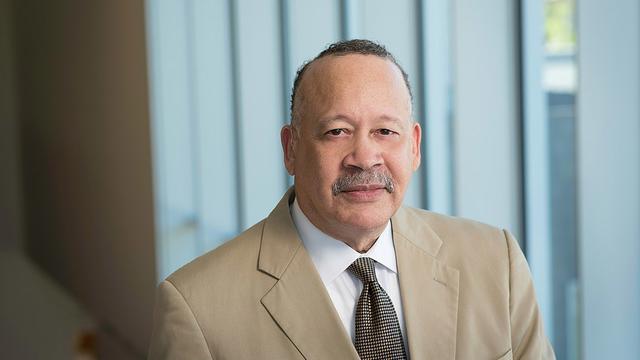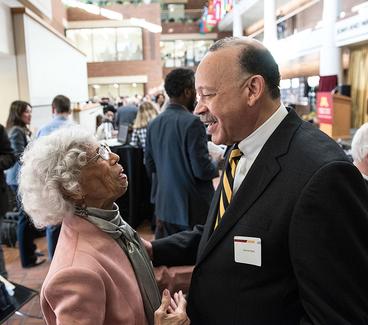Known as a brilliant scholar and national authority on the study of racial disparities, Humphrey School Professor Samuel Myers Jr. is being honored with the University of Minnesota’s 2021 Josie R. Johnson Human Rights and Social Justice Award.
The award recognizes Johnson’s lifelong contributions to human rights and social justice, both within and beyond her tenure at the University of Minnesota. It honors University faculty, staff, and students who exemplify Johnson’s commitment to creating respectful and inclusive living, learning, and working environments.
Myers and two other recipients were recognized at a virtual awards ceremony on May 20.
Myers, an economist, joined the Humphrey School of Public Affairs in 1992 to lead the newly established Roy Wilkins Center for Human Relations and Social Justice. Using an integrated model of research, dialogue, and community partnerships, the center guides and empowers policymakers and community leaders in developing and promoting solutions to the problems of racism and racial and ethnic inequality.
Rigorous research and social justice
As director of the Roy Wilkins Center, Myers has become a national authority on the study of racial disparities in a range of areas including criminal justice, education, mortgage lending, drowning rates, and procurement and contracting.
Humphrey School Dean Laura Bloomberg described Myers, a longtime colleague, as a brilliant scholar.
“Dr. Myers’s work is centered at a distinctive intersection of economics and social justice, and has been highly influential locally, nationally, and globally,” Bloomberg said. “Of particular local significance, Dr. Myers coined the term Minnesota Paradox to describe, explore, and spur action to overcome persistent racial disparities afflicting our state.”
In his nomination letter, Humphrey School Professor Joe Soss described Myers’s “fierce commitment to combining the highest standards of rigorous research with work that is rooted in community needs and social justice agendas.”
“Dr. Myers has been a tireless advocate for diversity, equity, and inclusion efforts at the Humphrey School and at the University of Minnesota—since long before those terms were commonly heard on college campuses,” Soss added. “In his home field of economics, he has repeatedly called attention to and challenged racial biases in the assumptions that underlie leading economic models, in evaluations of scholars and their work, and in the field’s historical complicity in racial injustices.”
Impact on communities of color
In addition to his academic work, Myers has supported various efforts to empower communities of color and their leaders as they advance professionally and educationally, including:
- Serving as a faculty mentor in the McNair Scholars program, which seeks to increase the number of doctoral program applications, matriculation, and degree attainment by underrepresented and first-generation college students.
- Teaching Public Policy Analysis to top African American administrators throughout the country, in partnership with the National Forum of Black Public Administrators’ Executive Leadership Institute.
- Creating and running the Roy Wilkins Community Fellows program, which brought together staff from local nonprofit organizations that serve people of color to strengthen their policy analysis skills and advance policy changes affecting their clients and communities.
Sharon Sayles Belton, former mayor of Minneapolis and currently an executive with Thomson Reuters, has collaborated with Myers on a variety of public policy matters related to racial and economic disparities over the years.
“I have found him to be a tireless advocate for social justice, who is dedicated to empowering communities of color to bring their authentic voice and experience to public policy discussions that affect their lives and the communities where they live and work,” she said.
Johnson is 'idol and role model'
The award’s namesake, Josie Robinson Johnson, is a highly regarded civil rights activist in her own right, and a strong supporter of the Humphrey School. A fellowship in her name, established by the School in 2018, supports graduate students who have specific interests in addressing racial inequities and injustice.
“Josie Johnson is my idol and role model,” said Myers. “She introduced me to many local community elders and encouraged me to do what I have been attempting to do since I arrived here in 1992: be the best possible academic researcher and to undertake research and scholarship on behalf of communities of color.”
According to Bloomberg, Myers has more than achieved that goal.
“Like Josie Robinson Johnson, Dr. Myers is both a giant in the quest for equity and justice, and a shining presence beloved throughout the Humphrey community and far beyond. He is a uniquely knowledgeable, passionate, imaginative, and effective catalyst for the sort of change that the Josie R. Johnson Human Rights and Social Justice Award was designed to celebrate and to advance. I am hard pressed to think of a more worthy recipient.”
Alumnus also recognized
Also receiving the Josie R. Johnson Award is Humphrey School alumnus Amelious Whyte Jr. (MA ‘98, PhD CEHD ‘15), currently director for Public Engagement in the University’s College of Liberal Arts. Whyte is an active member of the Humphrey School’s alumni community, and served on the Dean’s Advisory Council from 2010 to 2016.



